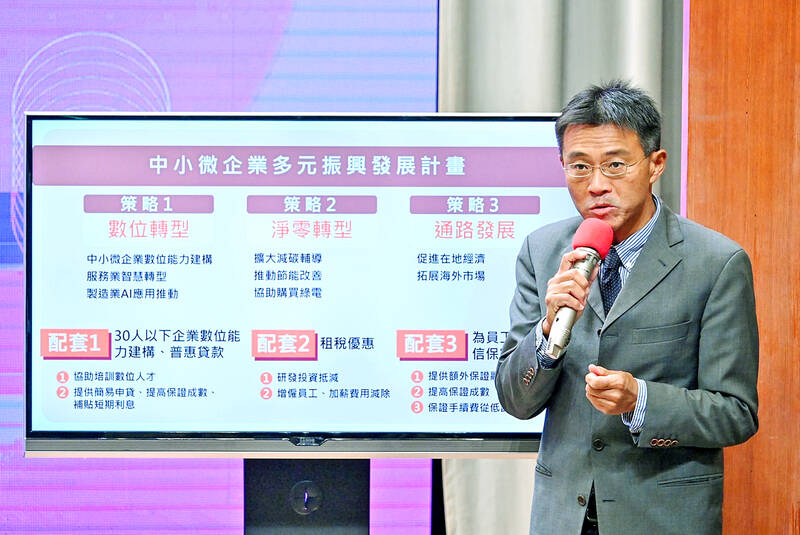The Executive Yuan yesterday approved a development plan for small and medium enterprises (SMEs), which includes preferential loans, tax incentives and digital transformation support.
The plan offers tax incentives for research and development, intellectual property rights, and employee expansion and salary raises, with the latter also opening the door to additional government subsidies.
Taiwan’s economic achievements and performance depend on its 1.63 million small businesses, which also contribute to the nation’s economic stability and well-being, Executive Yuan spokesperson Michelle Lee (李慧芝) quoted Premier Cho Jung-tai (卓榮泰) as saying during the Cabinet meeting.

Photo courtesy of the Executive Yuan
The plan is focused on helping SMEs expand their access to domestic and international markets, and support their transition to a digital economy and net zero emissions, Small and Medium Enterprise Startup Administration Director-General Lee Guann-jyh (李冠志) said.
The preferential loan program specifically targets SMEs with less than 30 employees, Lee said.
Taiwan has 1.43 million small businesses that have less than 30 employees, which account for 87 percent of all SMEs, Lee added.
The program offers subsidies of up to NT$100,000 (US$3,102) for SMEs that are undergoing digital transformation to help mitigate the impact of minimum wage increases and help cover the cost of training employees, he said.
If these businesses increase revenue and provide salary raises, they can receive additional subsidies, he added.
To encourage wage increases, the government is considering a fund that SMEs can access upon providing raises that could be worth NT$35 million at a low handling fee of 0.1 percent, Lee said.
The incentives are to be retroactive from Jan. 1 and continue until Dec. 31, 2033.
Additionally, the Ministry of Economic Affairs plans to incorporate tax incentives for industrial holding companies into amendments to the Statute for Industrial Innovation (產業創新條例), Deputy Minister of Economic Affairs Ho Chin-tsang (何晉滄) said.
These proposals were originally suggested by the National Development Council in hopes of supporting key manufacturing sectors, he added.

An undersea cable to Penghu County has been severed, the Ministry of Digital Affairs said today, with a Chinese-funded ship suspected of being responsible. It comes just a month after a Chinese ship was suspected of severing an undersea cable north of Keelung Harbor. The National Communications and Cyber Security Center received a report at 3:03am today from Chunghwa Telecom that the No. 3 cable from Taiwan to Penghu was severed 14.7km off the coast of Tainan, the Ministry of Digital Affairs said. The Coast Guard Administration (CGA) upon receiving a report from Chunghwa Telecom began to monitor the Togolese-flagged Hong Tai (宏泰)

A cat named Mikan (蜜柑) has brought in revenue of more than NT$10 million (US$305,390) for the Kaohsiung MRT last year. Mikan, born on April 4, 2020, was a stray cat before being adopted by personnel of Kaohsiung MRT’s Ciaotou Sugar Refinery Station. Mikan was named after a Japanese term for mandarin orange due to his color and because he looks like an orange when curled up. He was named “station master” of Ciaotou Sugar Refinery Station in September 2020, and has since become famous. With Kaohsiung MRT’s branding, along with the release of a set of cultural and creative products, station master Mikan

RISING TOURISM: A survey showed that tourist visits increased by 35 percent last year, while newly created attractions contributed almost half of the growth Changhua County’s Lukang Old Street (鹿港老街) and its surrounding historical area clinched first place among Taiwan’s most successful tourist attractions last year, while no location in eastern Taiwan achieved a spot in the top 20 list, the Tourism Administration said. The listing was created by the Tourism Administration’s Forward-looking Tourism Policy Research office. Last year, the Lukang Old Street and its surrounding area had 17.3 million visitors, more than the 16 million visitors for the Wenhua Road Night Market (文化路夜市) in Chiayi City and 14.5 million visitors at Tainan’s Anping (安平) historical area, it said. The Taipei 101 skyscraper and its environs —

Taiwan on Friday said a New Zealand hamburger restaurant has apologized for a racist remark to a Taiwanese customer after reports that it had first apologized to China sparked outrage in Taiwan. An image posted on Threads by a Taiwanese who ate at Fergburger in Queenstown showed that their receipt dated Sunday last week included the words “Ching Chang,” a racial slur. The Chinese Consulate-General in Christchurch in a statement on Thursday said it had received and accepted an apology from the restaurant over the incident. The comment triggered an online furor among Taiwanese who saw it as an insult to the